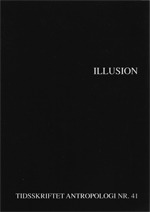DEN MAGISKE ILLUSION? En kognitiv tilgang til magiske ritualer
DOI:
https://doi.org/10.7146/ta.v0i41.107471Resumé
The concept of magic is one of the most
contested concepts in anthropology. It has
been criticised as an illusion created by early
anthropology’s primitivist understanding of
other – notably non-European – cultures.
This has led to a general agreement to
abandon the term, if not in praxis then
theoretically. The author questions whether
the concept should be abandoned and instead
he proposes a reformulation based on the
realisation that magic is a broad analytical
category about which one cannot produce
theories. Rather, theories must address the
phenomena observed and categorised as
magic. The author advocates a cognitive
approach to magic and magical ritual based
on the theory of “conceptual blending”
proposed by linguist Gilles Fauconnier and
literary Mark Turner. The theory of conceptual
blending presents a new possibility
to approach the explicitly metaphorical and
metonymic content in magical practices and
spells. Thus, magic is not based on a special
type of causality, but rather in the exploitation
of ordinary cognitive procedures
in special pragmatic circumstances, namely
ritual, in order to achieve a specific result. At
the same time, the author aims to show how
symbolic interpretations are de-emphasised
in magical rituals in order to enhance more
basic processes of meaning construction,
which gives magic a special relation to
institutionalised religion.
Downloads
Publiceret
Citation/Eksport
Nummer
Sektion
Licens
Ophavsretten til artiklerne i Tidsskriftet Antropologi tilfalder forfatteren.
Artikler publiceret i Tidsskriftet Antropologi må citeres, downloades og videresendes for ikke-kommerciel brug, under forudsætning af normal akademisk reference til forfatter(e) samt tidsskrift, årgang, nummer og sider. Artiklerne må kun genudgives med eksplicit tilladelse fra forfatter(e) og tidsskriftet.


